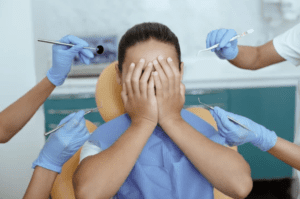If you have fear or anxiety about visiting the dentist, you are not alone. Dental anxiety is common among patients. Rather than letting your fears get in the way of your health, talk to your dentist about your options. Your dentist is here to help you, so let them minimize your anxiety.

Ways to Help Your Anxiety
When you have anxiety, it can be hard to rationalize your fears. However, there are several ways that you can help minimize your stress about your dental appointments.
Talk to Your Dentist
One of the best ways to reduce dental anxiety is to talk to your dentist. Many times, it is the fear of the unknown that can cause anxiety. To combat this, you can ask your dentist about the procedure. They will be able to describe their process and put your mind at ease. For example, your dentist may explain how they fill a cavity. Then, before they numb the area, they can walk you through the procedure step-by-step.
Alternatively, you can request that your dentist tells you what step they will do as they do it. For example, they will tell you which tool they will use to drill out a cavity. Then, they will explain how they will drill out the decay. When they move to a new tool or a new step, they can tell you what they are doing. This method can prepare you for each step during any procedure.
Sedation
Another option that your dentist can offer you is sedation. Dentists and other medical professionals use sedation to help relax patients for various procedures. There are a few different types of sedation that you can choose.
Nitrous oxide is a type of sedation your dentist can give you in their office. You may be familiar with its other name–laughing gas. Your dentist will administer the gas through a mask or nosepiece before your procedure begins. Fortunately, the effects of nitrous oxide begin quickly. As a result, you will feel a sense of calm and stay awake through your procedure. Once your dentist reverses the gas, the effects of the gas leave your system, meaning you can drive yourself home.
Another form of sedation is oral conscious sedation (OCS), which is usually a pill. It generally takes an hour for this sedation to set in. This means you may take it before you come to the dentist, or you will take it in the office in a quiet room. Because the effects of OCS are more potent, you will need someone to drive you to and from the appointment.
Finally, you can talk to your dentist about IV sedation. Your dentist will administer IV sedation through an IV line. Depending on the procedure, IV sedation may be standard practice. However, if you have severe dental anxiety, you and your dentist may choose this as the best option.
Bring A Friend
Consider bringing a friend to your appointment if sedation is not suitable for you. Moral support can go a long way in minimizing your anxiety.
